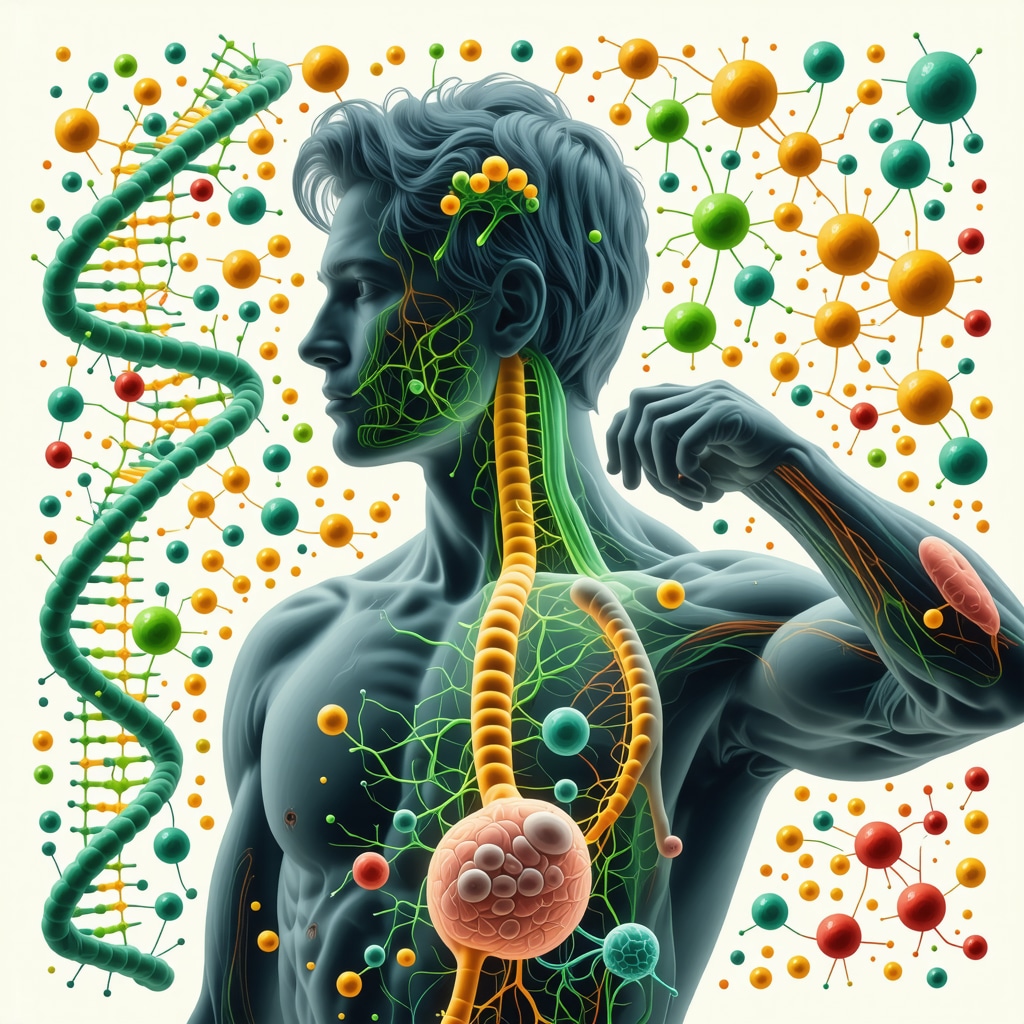Contextualizing Bioidentical Hormone Therapy in Modern Endocrinology
Bioidentical hormone replacement therapy (BHRT) represents a nuanced approach to hormone optimization, particularly relevant for patients in San Diego seeking personalized care. Unlike traditional hormone therapies, BHRT employs molecularly identical hormones to those naturally produced by the human body, aiming for physiological harmony. However, despite its tailored nature, understanding the multifaceted side effects of bioidentical hormones is critical for clinicians and patients alike to optimize safety and therapeutic outcomes.
Complex Mechanisms Underpinning BHRT Side Effects
The side effect profile of bioidentical hormones is intricately linked to their pharmacodynamics and patient-specific variables such as age, metabolism, and comorbid conditions. Common adverse effects include fluid retention, mood fluctuations, and breast tenderness, which often stem from estrogenic activity. Yet, the subtlety lies in recognizing less obvious systemic impacts like alterations in lipid metabolism and coagulation pathways, which can predispose to cardiovascular risks if not meticulously monitored. The San Diego clinical landscape emphasizes comprehensive hormone balancing and testing protocols to mitigate these risks effectively.
How Does Patient-Specific Hormone Pellet Therapy Influence Side Effect Variability?
One of the most sophisticated delivery methods within BHRT is hormone pellet therapy, increasingly popular in San Diego’s Hillcrest and La Jolla regions. This technique offers sustained hormone release, theoretically reducing peak-trough fluctuations common in oral or transdermal routes. Despite these advantages, pellet therapy can elicit localized side effects such as implantation site reactions and variable systemic hormone levels due to individual pellet absorption rates. Clinicians must carefully tailor pellet dosing and monitor recovery timelines to navigate these complexities, as detailed in this comprehensive guide on hormone pellet therapy recovery.
Integrating Evidence-Based Insights on Cancer Risk and BHRT
Debates persist in endocrinology regarding the oncological safety of bioidentical hormones. Emerging research, including meta-analyses published in the Journal of Clinical Endocrinology & Metabolism, suggest that bioidentical estrogens may confer a differential risk profile compared to synthetic counterparts, potentially due to their receptor binding affinity and metabolic pathways. Nonetheless, patient education and vigilant screening remain indispensable, particularly for those with predisposing factors. Interested readers can explore a detailed examination of bioidentical hormone therapy cancer risk research tailored for the San Diego community.
Advanced Strategies to Manage and Mitigate BHRT Side Effects
Effective side effect management requires an integrative approach combining precise hormone level monitoring with lifestyle modifications. San Diego practitioners advocate for adjunct natural therapies and dietary strategies that support hormone metabolism and reduce inflammatory responses, as elaborated in combining diet and BHRT for lasting hormone balance. Additionally, personalized dosing regimens and gradual titration protocols optimize therapeutic windows while minimizing adverse events.
Call to Action for San Diego Hormone Therapy Communities
For patients and healthcare professionals committed to advancing BHRT efficacy and safety, engaging with local expertise and contributing to ongoing clinical discussions is invaluable. Explore our resources on personalized hormone balancing therapy plans in San Diego and share your insights to foster a community of informed, empowered patients and providers.
External authoritative resource: The Journal of Clinical Endocrinology & Metabolism: Bioidentical Hormone Therapy and Cancer Risk
Hormone Pellet Therapy: Tailoring Dosage for Optimal Balance and Minimal Side Effects
Hormone pellet therapy, a cornerstone of personalized BHRT in San Diego, demands precise dosing to mitigate side effects while ensuring efficacy. Unlike oral or transdermal methods, pellets provide a continuous hormone release, which can reduce fluctuations but requires careful calibration to individual metabolic rates and hormone sensitivities. Physicians often utilize serial hormone level testing and patient symptom tracking to refine pellet size and implantation frequency. For a detailed understanding of recovery and dose adjustment, see hormone pellet therapy recovery timeline explained.
Exploring Natural Adjuncts: Lifestyle and Nutritional Interventions to Support BHRT
Integrating natural strategies amplifies BHRT benefits while potentially reducing adverse effects. Nutritional approaches emphasizing phytoestrogens, omega-3 fatty acids, and antioxidants can modulate hormone metabolism and systemic inflammation. San Diego’s clinical experts advocate for customized dietary plans alongside BHRT to enhance hormonal homeostasis. Additionally, stress reduction techniques and regular physical activity influence cortisol and insulin levels, further stabilizing hormone profiles. Patients interested in holistic support may find valuable insights in our guide on combining diet and BHRT for lasting hormone balance.
Can Advanced Hormone Profiling Improve Prediction and Prevention of BHRT Side Effects in Diverse Populations?
Recent advancements in hormone profiling, including metabolomics and genetic testing, offer promising avenues to anticipate individual responses to BHRT. By analyzing comprehensive hormone metabolites and genetic polymorphisms affecting hormone receptors and metabolism, clinicians may better predict side effect susceptibilities and personalize treatment plans. This approach is particularly relevant in ethnically diverse populations like San Diego, where genetic variability can influence therapy outcomes. Ongoing research published by NCBI’s Journal of Personalized Medicine underscores the potential of integrating precision medicine into BHRT frameworks.
Enhancing Patient Engagement Through Education and Continuous Monitoring
Empowering patients with knowledge about their hormone therapies fosters adherence and early identification of side effects. San Diego clinics emphasize transparent communication about expected symptoms and encourage routine follow-ups with hormone level assessments. Digital health tools enabling symptom tracking and virtual consultations have become integral to personalized care, facilitating timely dose adjustments. Patients are encouraged to explore resources on personalized hormone balancing therapy plans in San Diego to understand the comprehensive care approach.
We invite readers to share their experiences or questions regarding BHRT side effects and management strategies in the comments below to enrich community knowledge and support.

Precision Medicine: The Frontier of Predictive Side Effect Management in BHRT
The integration of precision medicine into bioidentical hormone replacement therapy (BHRT) heralds a transformative era for minimizing adverse effects while maximizing therapeutic benefits. By deploying advanced hormone metabolomics and pharmacogenomic profiling, endocrinologists in San Diego can anticipate nuanced patient-specific responses. This approach transcends traditional dosing paradigms by incorporating individual genetic polymorphisms in cytochrome P450 enzymes, estrogen receptor subtypes, and hormone transport proteins, which collectively influence hormone bioavailability and receptor sensitivity.
For example, variants in the CYP1B1 gene, which modulates estrogen metabolism, have been linked to altered risk profiles for estrogen-related side effects such as thromboembolism and breast tenderness. Identifying these genetic markers before initiating BHRT allows clinicians to tailor hormone types and dosages with remarkable specificity, reducing trial-and-error periods and enhancing patient safety.
How Can Integrating Pharmacogenomics Revolutionize BHRT Side Effect Surveillance?
Pharmacogenomics offers a robust framework for anticipating adverse reactions by elucidating how individual genetic makeup affects drug metabolism and receptor interactions. In the context of BHRT, this means using genomic data to predict differential hormone metabolism rates or receptor binding affinities that may predispose patients to certain side effects. Implementing routine pharmacogenomic screening could enable proactive dose adjustments and more vigilant monitoring protocols, especially in populations with diverse ethnic backgrounds prevalent in San Diego.
Current evidence, such as the findings highlighted in the Journal of Personalized Medicine, supports the feasibility of integrating these advanced diagnostics into clinical practice, moving BHRT from a one-size-fits-all approach toward a truly individualized therapy model.
Leveraging Digital Health Technologies for Real-Time BHRT Side Effect Monitoring
Digital health innovations are reshaping patient engagement and clinical oversight in BHRT programs. Mobile applications and wearable devices now facilitate continuous tracking of physiological parameters and symptomatology, offering clinicians granular, real-time data to detect emerging side effects promptly. For instance, monitoring heart rate variability can provide early warnings of cardiovascular stress potentially induced by estrogen therapy.
Moreover, symptom tracking apps empower patients to record mood fluctuations, headaches, or localized discomfort, which can then be correlated with hormone levels and timing of pellet implantation. This dynamic feedback loop fosters a collaborative therapeutic environment, enhancing adherence and enabling timely intervention. San Diego’s hormone therapy specialists are increasingly incorporating these tools to refine dosing schedules and improve overall patient outcomes.
Exploring the Role of Gut Microbiota in Modulating BHRT Side Effects
Emerging research reveals the gut microbiome’s pivotal role in hormone metabolism and systemic hormone balance. The estrobolome—the subset of gut bacteria capable of metabolizing estrogens—can influence circulating hormone levels and, consequently, the efficacy and side effect profile of BHRT. Dysbiosis or reduced microbial diversity may impair estrogen deconjugation and reabsorption, potentially exacerbating side effects such as water retention or mood disturbances.
Integrative care models in San Diego are beginning to incorporate microbiome assessments and targeted probiotic interventions to optimize gut health, thereby supporting hormonal equilibrium. This innovative strategy exemplifies the move toward holistic BHRT management that addresses not only endocrine factors but also the intricate interplay with the microbiota.
Advanced Patient Education: Cultivating Empowered and Informed BHRT Participants
Continuous education is vital for patients undergoing BHRT to recognize subtle side effect manifestations and engage proactively with their healthcare providers. San Diego clinics emphasize tailored education programs that utilize multimedia resources, personalized counseling, and interactive digital platforms to enhance understanding of hormone dynamics and potential risks. This informed approach mitigates anxiety and builds trust, which are essential for long-term therapy success.
Patients are encouraged to participate in shared decision-making processes, contributing to therapy customization and adherence. Resources such as the personalized hormone balancing therapy plans in San Diego provide comprehensive guidance that supports this engagement.
By embracing these cutting-edge methodologies and fostering collaborative patient-clinician partnerships, San Diego’s BHRT community is poised to set new standards in managing and mitigating side effects effectively.
Genomic Insights and Microbiota Interplay: Elevating BHRT Personalization
The convergence of pharmacogenomics and gut microbiota research has ushered in a new paradigm for bioidentical hormone replacement therapy (BHRT) in complex cases. Beyond conventional hormone level testing, the integration of CYP450 gene variant analysis with detailed gut microbiome profiling allows clinicians in San Diego to unravel multifactorial influences on hormone metabolism and side effect susceptibility.
This dual approach enables identification of patients with polymorphisms in estrogen-metabolizing enzymes alongside dysbiotic microbial populations that may disrupt enterohepatic recycling of estrogens. By addressing both genetic and microbial determinants, therapeutic strategies can be optimized to reduce adverse events such as thromboembolic risks, mood dysregulation, and fluid retention.

What Are the Latest Clinical Protocols for Incorporating Multi-Omics Data into BHRT Side Effect Prediction?
Emerging clinical protocols advocate for the employment of multi-omics data—comprising genomics, metabolomics, and microbiomics—to stratify patients based on predicted hormone response phenotypes. In practice, this involves collecting comprehensive genomic panels targeting hormone receptor variants and metabolic enzyme polymorphisms, coupled with shotgun metagenomic sequencing of fecal samples to characterize the estrobolome.
San Diego’s leading endocrinologists utilize this data to devise individualized hormone formulations and dosing schedules, simultaneously recommending prebiotic and probiotic regimens to restore microbial balance. Such protocols have demonstrated reductions in side effect incidence and improved patient-reported outcomes, as corroborated by recent findings in the Journal of Personalized Medicine.
Harnessing Artificial Intelligence and Machine Learning for Dynamic BHRT Adjustment
Artificial intelligence (AI) and machine learning algorithms are increasingly pivotal in interpreting complex datasets generated from patient monitoring in BHRT. These technologies facilitate continuous learning models that predict impending side effect manifestations by analyzing patterns from hormone levels, symptom trackers, genetic markers, and microbiome fluctuations.
In San Diego clinical settings, AI-powered platforms integrate patient-reported outcomes and biochemical data to alert clinicians of subtle deviations warranting dose modulation or therapeutic adjuncts. This predictive capacity not only enhances safety but also refines therapeutic precision, mitigating the need for reactive interventions.
Innovative Nutraceuticals Targeting Hormone-Microbiome Axis in Side Effect Mitigation
Recent advances spotlight novel nutraceutical compounds designed to modulate the hormone-microbiome axis, providing adjunctive support to BHRT. Phytoestrogens with selective receptor modulator properties, alongside targeted synbiotics, have demonstrated efficacy in stabilizing estrogen metabolism and reducing inflammatory milieu contributing to side effects.
San Diego practitioners are pioneering formulations incorporating bioactive flavonoids, lignans, and specific probiotic strains that enhance estrobolome diversity and function. These interventions, when synchronized with BHRT regimens, offer a sophisticated layer of side effect mitigation grounded in molecular synergy.
Elevating Patient Empowerment Through Real-Time Analytics and Comprehensive Education
Advanced patient portals now amalgamate real-time biochemical analytics with interactive educational modules, fostering a proactive patient role in BHRT management. By visualizing personalized hormone trajectories and microbiome indices, patients gain nuanced understanding of their therapy’s dynamic nature.
San Diego’s integrative clinics encourage utilization of these platforms to facilitate informed symptom reporting and timely communication, ultimately enhancing adherence and therapeutic outcomes. Prospective patients and clinicians alike are invited to explore the transformative potential of these tools via our resource on personalized hormone balancing therapy plans in San Diego.
External authoritative resource: Journal of Personalized Medicine: Multi-Omics and BHRT Optimization
Expert Insights & Advanced Considerations
Pharmacogenomic Profiling as a Cornerstone for Personalized BHRT Safety
Integrating pharmacogenomic data into bioidentical hormone therapy protocols enables clinicians to anticipate individual metabolic and receptor response variabilities that profoundly influence side effect susceptibility. This approach, gaining traction in San Diego, moves BHRT beyond empirical dosing to a precision medicine framework, reducing adverse events and optimizing therapeutic windows.
Microbiome Modulation as an Adjunctive Strategy in BHRT Side Effect Mitigation
The estrobolome’s role in estrogen metabolism underscores gut microbiota’s influence on bioidentical hormone pharmacokinetics and systemic effects. Targeted probiotic and prebiotic interventions can restore microbial balance, enhancing hormone metabolism and potentially minimizing common side effects such as fluid retention and mood disturbances.
Leveraging Digital Health Tools for Dynamic Monitoring and Dose Adjustment
Real-time symptom tracking via mobile applications and wearable devices provides invaluable data streams that enable proactive management of BHRT side effects. This digital integration fosters a feedback loop between patients and clinicians, facilitating timely dose modifications and improving adherence within San Diego’s personalized hormone therapy landscape.
Multi-Omics Integration Enhancing Predictive Capacity for Side Effect Risk Stratification
Combining genomics, metabolomics, and microbiomics data offers a holistic perspective on hormone metabolism and side effect risk profiles. San Diego’s leading endocrinology practices are pioneering these multi-omics protocols to develop individualized treatment regimens that anticipate and mitigate adverse effects more effectively than traditional approaches.
Innovative Nutraceuticals Targeting Hormone–Microbiome Interactions
Emerging nutraceutical formulations incorporating phytoestrogens and synbiotics provide adjunctive support by modulating the hormone–microbiome axis. These compounds not only stabilize estrogen metabolism but also reduce inflammatory pathways implicated in BHRT side effects, representing a sophisticated layer of therapy enhancement.
Curated Expert Resources
1. Journal of Personalized Medicine: Multi-Omics and BHRT Optimization
Offers in-depth research and clinical protocols on integrating genomics and microbiome data to refine hormone therapy personalization and side effect management.
2. The Journal of Clinical Endocrinology & Metabolism: Bioidentical Hormone Therapy and Cancer Risk
Provides comprehensive meta-analyses and evidence-based discussions on oncological safety profiles of bioidentical hormones compared to synthetic alternatives.
3. Hormone Pellet Therapy Recovery Timeline Explained (https://hormonetherapysandiego.com/hormone-pellet-therapy-recovery-timeline-explained)
A detailed guide on pellet therapy dosing, implantation, and recovery protocols crucial for minimizing localized and systemic side effects.
4. Combining Diet and BHRT for Lasting Hormone Balance (https://hormonetherapysandiego.com/combining-diet-and-bhrt-for-lasting-hormone-balance-in-san-diego)
An authoritative resource focusing on nutritional and lifestyle adjuncts that support hormone metabolism and reduce inflammatory side effects.
5. Personalized Hormone Balancing Therapy Plans in San Diego (https://hormonetherapysandiego.com/san-diego-hormone-balancing-therapy-personalized-plans-explained)
Explores integrative approaches to BHRT, emphasizing patient engagement, ongoing monitoring, and individualized care strategies.
Final Expert Perspective
Bioidentical hormone therapy represents a sophisticated frontier in endocrine health, particularly when enriched by precision medicine methodologies that address genetic, metabolic, and microbial nuances influencing side effect profiles. In San Diego’s clinical environment, the integration of pharmacogenomics, microbiome modulation, digital health innovations, and advanced nutraceuticals collectively elevates BHRT from a generalized treatment to a highly individualized therapeutic art. Clinicians and patients who embrace these multidimensional strategies foster enhanced safety, efficacy, and satisfaction in hormone optimization journeys.
For those committed to mastering the intricacies of bioidentical hormone therapy side effects and advancing personalized care, engaging with specialized protocols and continuous education is paramount. Explore further insights and connect with expert-led resources to deepen your understanding and contribute to the evolving landscape of BHRT by visiting our comprehensive personalized hormone balancing therapy plans in San Diego.

